|
In this section will be presented the information of a problem that can be changed through the Management  Problem menu. To do this, locate and select the desired problem. Then, click on the Problem menu. To do this, locate and select the desired problem. Then, click on the  button on the toolbar; at this point, the problem data screen will be displayed: button on the toolbar; at this point, the problem data screen will be displayed:
It is worth remembering that this operation can only be performed by users who have been defined at the time of process modeling, such as process managers or instance managers.
|
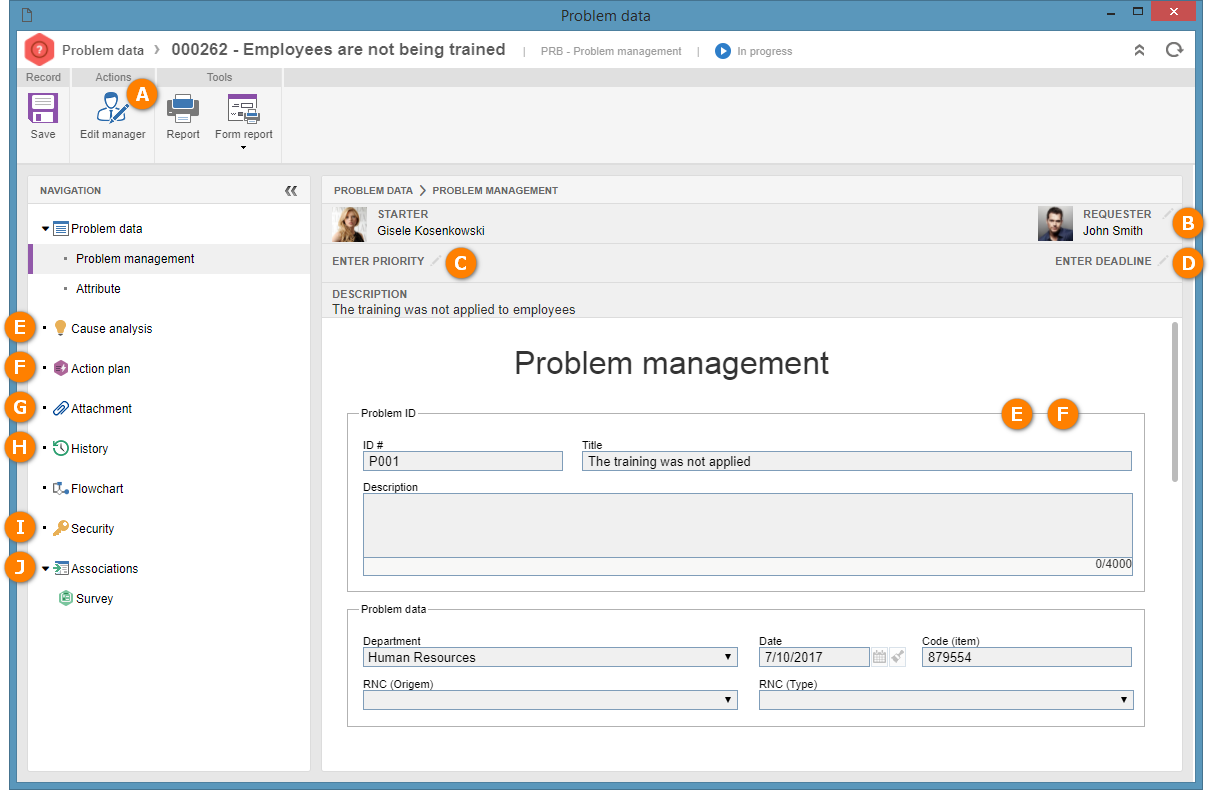
A
|
Click on the "Change Manager" button to change the instance manager.
|
B
|
Click on the  button to change the problem requester. button to change the problem requester.
|
C
|
Click on the  button to enter or change (if it has already been entered during the execution of the problem activities) the priority of the problem. button to enter or change (if it has already been entered during the execution of the problem activities) the priority of the problem.
|
D
|
Click on the  button to enter or change the problem execution deadline. button to enter or change the problem execution deadline.
|
E
|
In the Cause analysis section, on the Navigation panel or in the problem form, it is possible to view the analysis performed in the problem. This section will only be presented if the "Cause analysis" has been enabled during the process modeling. In order for this section to appear on the form, it will be needed for the associated form to be configured with the "Cause analysis" container.
|
F
|
In the Action plan section, on the Navigation panel or in the problem form, it is possible to view the problem action plans. This section will only be presented if the association with SE Action Plan has been enabled during the process modeling. In order for this section to appear on the form, it will be needed for the associated form to be configured with the "Action plan" container and that the process activities are set up to display the action plans.
|
G
|
In the Attachment section, on the Navigation panel, in addition to viewing the attachments of the problem, it is possible to add new attachments to the problem.
|
H
|
In the History section, in the Navigation panel, in addition to viewing the history of the problem, it is possible to add comments about the instance, as well as to check the association or disassociation of action plans and isolated actions.
|
I
|
In the Security section, in the Navigation panel, change the security list of the instance.
|
J
|
In the Associations section, in the Navigation panel, will be displayed the objects that were associated with the problem. If no object has been associated, this section will not be displayed. Note: The instance/process manager may add/associate/disassociate objects.
|
To change the instance manager, click on the "Edit manager" button located on the data screen buttons panel (Ribbon). Then, select the new instance manager through the screen that will be displayed:
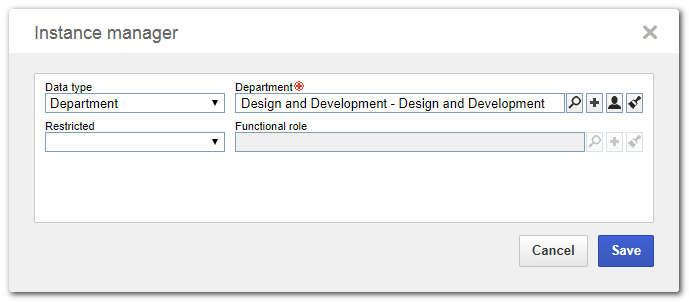
Data type: Set the problem manager type. According to the selected type, the field next to it will be enabled to select the desired Manager. If the selected manager is a specific Department, the following field will be enabled:
Restricted: Select one of the options to restrict the problem managers belonging to the Department selected previously. According to the selected option, the field located next to the field will be enabled to select the position or functional role of the users who will be the managers of the problem.
|
To change the problem requester, access the Problem data, located on the Navigation panel. Then, click on the  button next to the Requester field and, on the screen that opens, select the user that will be the requester of the problem. It is important to point out that this option will only be displayed if, in the process data (Configurations button next to the Requester field and, on the screen that opens, select the user that will be the requester of the problem. It is important to point out that this option will only be displayed if, in the process data (Configurations  Instance), the "Allow entering requester" option is checked. Instance), the "Allow entering requester" option is checked.
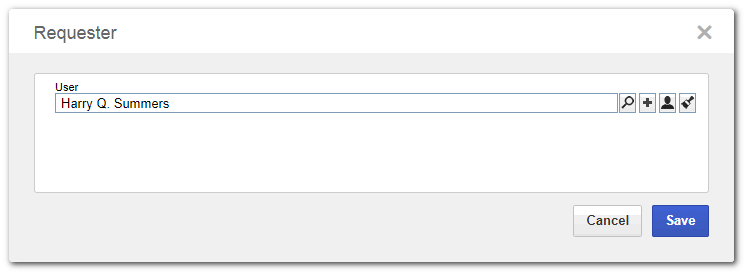
|
To enter or change the problem priority, access the Problem data, located in the Navigation panel. Then, click on the  button next to the Enter priority/Priority field and, on the screen that will be displayed, select the value of each evaluation criterion. The method to inform the available values and criteria will vary according to the configurations made in the evaluation method defined in the process (SE Process). It is important to point out that this option will only be displayed if, in the process data (Configuration button next to the Enter priority/Priority field and, on the screen that will be displayed, select the value of each evaluation criterion. The method to inform the available values and criteria will vary according to the configurations made in the evaluation method defined in the process (SE Process). It is important to point out that this option will only be displayed if, in the process data (Configuration  Instance), an evaluation method is associated. Instance), an evaluation method is associated.
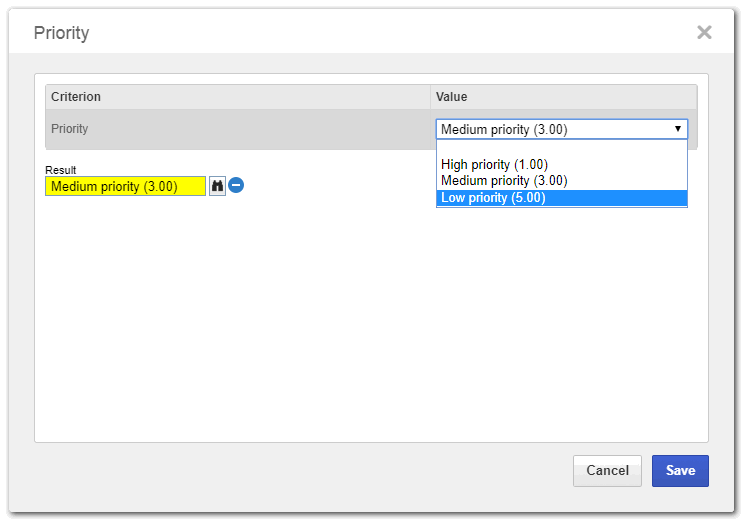
|
To enter or change the problem deadline, access the Problem data, located in the Navigation panel. Then, click on the  button next to the Enter deadline field and, on the screen that will open, enter the date and time limit for the end of the problem execution. If the Duration field on the process data screen (SE Process) is set, this option will display the deadline calculated according to the entered value and the calendar used by the process, but it will be possible to edit it. button next to the Enter deadline field and, on the screen that will open, enter the date and time limit for the end of the problem execution. If the Duration field on the process data screen (SE Process) is set, this option will display the deadline calculated according to the entered value and the calendar used by the process, but it will be possible to edit it.
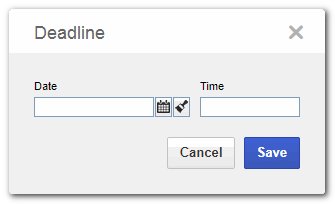
|
Through the Attachment section, located in the Navigation panel, it is possible to view attachments that are added to the activities of the problem in question. On this screen, the manager may also add new attachments. The attachments added by the manager may be changed and/or removed, but the attachments added during the execution of the activities cannot be changed/removed.
For further details on how to associate attachments with the record, see the Adding attachments section.
|
|
To add comments to the instance, click on the "Comment" button located on the button panel (Ribbon) of the data screen. After clicking on this button, a screen will be displayed in which the comment must be entered, allowing a user to be notified by mentioning them through @user. The comment feature is also available in the History section located in the Navigation panel. Through the History section, it is possible to view the main events that occurred during the execution of the workflow until the current date. By checking the "Show all history" option, all events that occurred until the current date will be displayed in detail.
On the screen that will be displayed, enter the comment you wish and, if necessary, check the "Set comment as restricted" option so that the comment is not visible to the requester. The comment will be displayed in the timeline. It is possible to edit the comment or delete it from the timeline through the Edit and Delete buttons in the comment event.
Notice that:
▪When accessing the workflow data screen through the My problems task, it will only be possible to edit/delete the comment that you have added, provided that this comment has not been added through the activity data screen. ▪If you are the instance manager, by accessing the workflow data screen, you may change/delete a comment made by any user, as long as the comment was not added during the execution of an activity. |
|
Through the Security section, located in the Navigation panel, in addition to viewing, it will also be possible to change the problem security list. If the "Inherit security list from process" option is checked, it indicates that the security configurations determined for the process (SE Process) will also be valid for the problem. If the option is unchecked, these buttons will be enabled:

|
Click on this button to add a new access control to the problem in question. See more details about this operation in the Security section.
|

|
Click on this button to edit an access control of the problem in question. See more details about this operation in the Security section.
|

|
Click on this button to remove an access control of the problem in question.
|

|
Click on this button so that the process access control list is copied to the problem in question, allowing other access controls to be inserted as well. If, upon clicking on this button, there are already records in the problem security, the process security list will be added to the existing list in the problem.
|
|
The other sections of the problem data screen allow you to view the information that is filled during the execution of the activities of the problem in question.
|
|







